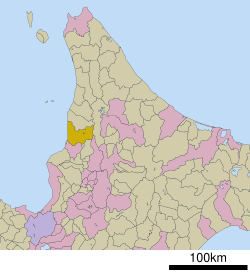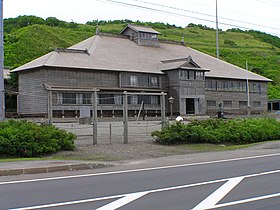Obira, Hokkaido
Obira
小平町 | |
|---|---|
 Obira town hall | |
 Location of Obira in Hokkaido (Rumoi Subprefecture) | |
 | |
| Coordinates: 44°0′56″N 141°39′46″E / 44.01556°N 141.66278°E | |
| Country | Japan |
| Region | Hokkaido |
| Prefecture | Hokkaido (Rumoi Subprefecture) |
| District | Rumoi |
| Area | |
• Total | 627.22 km2 (242.17 sq mi) |
| Population (January 31, 2025) | |
• Total | 2,660 |
| • Density | 4.2/km2 (11/sq mi) |
| Time zone | UTC+09:00 (JST) |
| City hall address | 216 Obiramachi, Obira-cho, Rumoi-gun, Hokkaido 078-3392 |
| Climate | Dfb |
| Website | Official website |
| Symbols | |
| Flower | Azalea |
| Tree | Japanese yew |


Obira (小平町, Obira-chō) is a town located in Rumoi Subprefecture, Hokkaido, Japan. As of 31 January 2025[update], the town had an estimated population of 2,660 in 1,499 households, and a population density of 4.2 people per km2.[1] The total area of the town is 627.22 km2 (242.17 sq mi).
Geography
[edit]Obira is located in the Rumoi jurisdiction in northern Hokkaido, bordered by the Sea of Japan to the west.
Neighbouring municipalities
[edit]Climate
[edit]Obira has a Humid continental climate (Köppen Dfb) characterized by cold summers and cold winters with heavy snowfall. The average annual temperature in Obira is 7.2 °C. The average annual rainfall is 1227 mm with September as the wettest month. The temperatures are highest on average in August, at around 20.9 °C, and lowest in January, at around -5.9 °C.[2]
| Climate data for Tappu, Obira (1991−2020 normals, extremes 1977−present) | |||||||||||||
|---|---|---|---|---|---|---|---|---|---|---|---|---|---|
| Month | Jan | Feb | Mar | Apr | May | Jun | Jul | Aug | Sep | Oct | Nov | Dec | Year |
| Record high °C (°F) | 7.4 (45.3) |
10.3 (50.5) |
15.5 (59.9) |
25.4 (77.7) |
32.5 (90.5) |
34.3 (93.7) |
36.5 (97.7) |
38.7 (101.7) |
32.1 (89.8) |
24.9 (76.8) |
20.9 (69.6) |
11.4 (52.5) |
38.7 (101.7) |
| Mean daily maximum °C (°F) | −2.0 (28.4) |
−1.1 (30.0) |
3.1 (37.6) |
9.7 (49.5) |
17.3 (63.1) |
21.8 (71.2) |
25.5 (77.9) |
26.0 (78.8) |
22.0 (71.6) |
15.1 (59.2) |
6.6 (43.9) |
−0.1 (31.8) |
12.0 (53.6) |
| Daily mean °C (°F) | −6.4 (20.5) |
−5.9 (21.4) |
−1.6 (29.1) |
4.2 (39.6) |
11.0 (51.8) |
15.8 (60.4) |
19.9 (67.8) |
20.5 (68.9) |
15.9 (60.6) |
9.2 (48.6) |
2.7 (36.9) |
−3.5 (25.7) |
6.8 (44.3) |
| Mean daily minimum °C (°F) | −11.8 (10.8) |
−12.0 (10.4) |
−7.1 (19.2) |
−1.1 (30.0) |
4.6 (40.3) |
10.5 (50.9) |
15.2 (59.4) |
16.0 (60.8) |
10.6 (51.1) |
4.1 (39.4) |
−1.0 (30.2) |
−7.3 (18.9) |
1.7 (35.1) |
| Record low °C (°F) | −29.7 (−21.5) |
−30.0 (−22.0) |
−25.0 (−13.0) |
−14.2 (6.4) |
−4.1 (24.6) |
−0.6 (30.9) |
4.9 (40.8) |
5.3 (41.5) |
0.1 (32.2) |
−5.2 (22.6) |
−15.4 (4.3) |
−28.6 (−19.5) |
−30.0 (−22.0) |
| Average precipitation mm (inches) | 155.2 (6.11) |
106.7 (4.20) |
90.9 (3.58) |
74.2 (2.92) |
88.0 (3.46) |
73.9 (2.91) |
148.1 (5.83) |
167.8 (6.61) |
172.0 (6.77) |
178.5 (7.03) |
202.9 (7.99) |
198.9 (7.83) |
1,653.6 (65.10) |
| Average rainy days | 22.6 | 18.9 | 17.6 | 12.6 | 12.2 | 10.6 | 11.7 | 13.0 | 14.7 | 17.7 | 21.5 | 25.2 | 198.3 |
| Mean monthly sunshine hours | 40.5 | 57.7 | 107.6 | 159.1 | 195.9 | 171.5 | 162.3 | 159.3 | 156.0 | 114.4 | 44.6 | 26.8 | 1,399.4 |
| Source 1: JMA[3] | |||||||||||||
| Source 2: JMA[4] | |||||||||||||
Demographics
[edit]Per Japanese census data, the population of Obira is as shown below. The town is in a long period of sustained population loss.
| Year | Pop. | ±% |
|---|---|---|
| 1940 | 9,651 | — |
| 1950 | 17,046 | +76.6% |
| 1960 | 14,711 | −13.7% |
| 1970 | 8,471 | −42.4% |
| 1980 | 6,474 | −23.6% |
| 1990 | 5,334 | −17.6% |
| 2000 | 4,566 | −14.4% |
| 2010 | 3,720 | −18.5% |
| 2020 | 2,994 | −19.5% |
History
[edit]Obira began as a settlement by Matsumae Domain for herring and salmon fishing in 1782. The Hanada family guardhouse was built in 1905. During the Meiji period and into the early Showa period, the area was part of the Rumoi coal fields. The last coal mine closed in the 1960s. Obira was raised to town status in 1966.
Government
[edit]Obira has a mayor-council form of government with a directly elected mayor and a unicameral town council of eight members. Obira, as part of Rumoi sub-prefecture, contributes one member to the Hokkaidō Prefectural Assembly. In terms of national politics, the town is part of the Hokkaidō 10th district of the lower house of the Diet of Japan.
Economy
[edit]The main industries of Obira are commercial fishing and agriculture. In addition to rice, various vegetables such as potatoes, peppers, and corn are grown. Flowers such as bellflowers have been actively cultivated in Obira due to the cool climate, and Japanese black beef is also shipped. In terms of seafood, scallops are cultivated and seed scallops are shipped to production areas around the country. Octopus are also landed. Sea urchins and sea cucumbers can be caught for a short period in summer.
Education
[edit]Obira has two public elementary schools and one public junior high school operated by the town government, and one public high school operated by the Hokkaidō Board of Education.
Transportation
[edit]Railways
[edit]After the closure of the Japan National Railway Teshio Line in 1987, the town has not had any passenger rail service.
Highways
[edit]Local attractions
[edit]- Hanada Family Banya, Former herring fishery, National Important Cultural Property
Mascot
[edit]
Obira's mascot is Obimaru (おびまる) who is a curious and kind heart superhero that resembles a bull. Legend has it that this figure was formed from a bull, a melon, an octopus, two scallops, two fishes and a rice bowl on August 12, 2014. No one knows its gender yet. It can eat anything that is locally produced especially melon, beef, octopus, scallops, herring and rice. His charm point is a red star on his forehead to show its status has mascot of the town.[5]
Notable people
[edit]- Masashi Abe, nordic combined skier and Olympic champions
References
[edit]- ^ "Obira Town official statistics" (in Japanese). Japan.
- ^ Obira climate: Average Temperature, weather by month
- ^ 観測史上1~10位の値(年間を通じての値). JMA. Retrieved February 21, 2022.
- ^ 気象庁 / 平年値(年・月ごとの値). JMA. Retrieved February 21, 2022.
- ^ "小平町PRキャラクター「おびまる」". Obira.
External links
[edit] Media related to Obira, Hokkaidō at Wikimedia Commons
Media related to Obira, Hokkaidō at Wikimedia Commons- Official Website (in Japanese)



